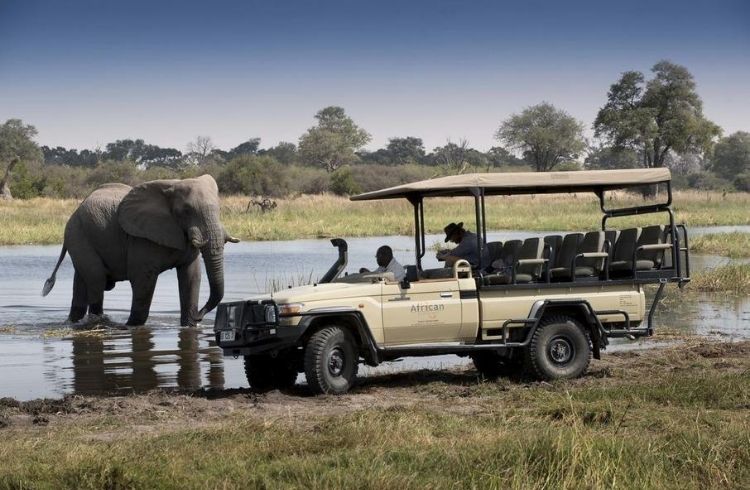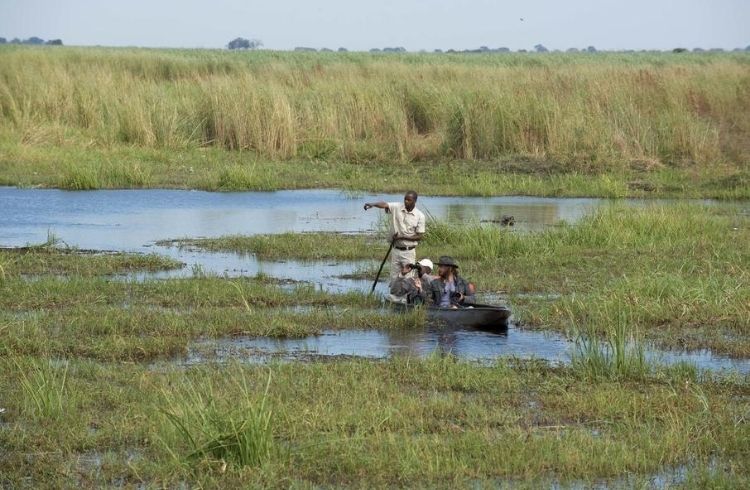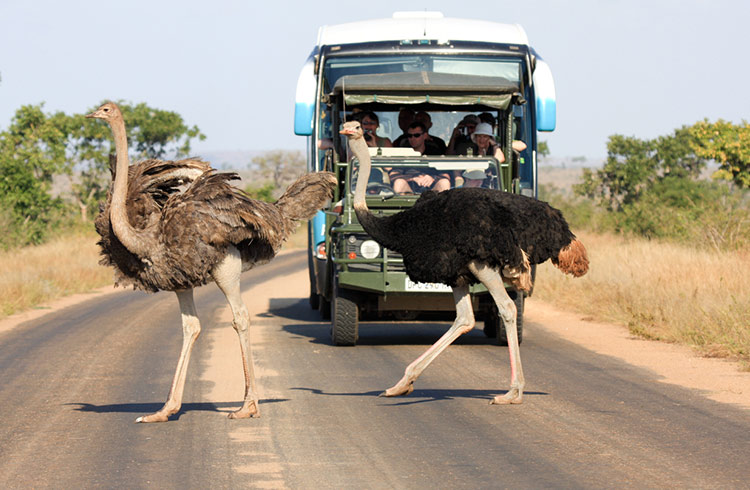In this episode, the African safari company embracing preventative measures to protect the health of guests and the increase in poaching during COVID-19.
 Photo © Supplied: Khwai Bush Camp Botswana
Photo © Supplied: Khwai Bush Camp Botswana
Listen Now
The World Nomads Podcast: Traveling during COVID-19
The World Nomads Travel Podcast has suspended its regular destination episodes, and in their place, sharing the thoughts of travelers who are shaping the future of the industry. We tap into their vast bank of knowledge to discover what can be learned from the past as we plan a new way of traveling moving forward.
What’s in the episode
00:42 Spike in poaching
02:40 Blindsided by the pandemic
04:50 Maintaining staff
06:40 Poaching on the increase
08:50 Africa devastated by COVID-19
12:20 Why a safari is best for your health and safety
16:19 Next episode
Quotes from the episode
"...we've actually noticed the animals have also been a little more skittish. It is a real threat, and it's a real and live danger that we face in terms of being custodians of these wildlife areas. I think the increase in poaching is where it's most prevalent. Without wildlife and these national parks, we have no tourism. Tourism and conservation really do go hand in hand." Karl African Bush Safaris
Who is in the episode
In this episode we speak with the Head of Partnerships Karl Parkinson, discussing African Bush Camps and the impact Coronavirus has had on the company, poaching and post COVID-19.
Beks Ndlovu is the founder of African Bush Camps and while not featured in this episode says, “The more time you spend in nature the more you understand your impact on it. We’re a group of travelers and nature lovers who want to show you the incredible spaces we love.”
We also learn about African Bush Camps Foundation Community Empowerment.
The Foundation is committed to partnering with rural communities in vulnerable wildlife areas. By creating opportunities to empower these communities through education, community empowerment, and conservation, we can improve their quality of life and achieve long-term conservation successes in Zimbabwe, Botswana, and Zambia

Resources & links
- Plan your safari.
- The latest Safari specials.
- ‘Safari TV’: for the latest industry talks – Safari Talks – and one-on-one chats between founder and CEO, Beks Ndlovu, and internal/external guests – Conversations with Beks.
- Information on the latest hygiene protocols in camp.
- For updates and news: follow African Bush Camps on Instagram, Facebook, and Twitter
- Our travelers recently helped protect wildlife from poachers in the Serengeti by making a micro-donation when they bought travel insurance with us.
- Wildlife Experiences to Avoid on Your Next Adventure
- Is it Ethical to Visit Animals in Wildlife Sanctuaries?
- Wednesday, August 12th, 2020 was World Elephant Day, an opportunity to reflect on why we should always commit to responsible travel practices when it comes to interacting with animals.
- Singapore has crushed ivory from nearly 300 elephants to deter illegal trading.
- If you get unexpectedly sick or injured overseas, your medical bills could be expensive. Make sure you pack travel insurance, with 24/7 emergency assistance.
- Travel safety alerts.
- You can get in touch with us by emailing podcast@worldnomads.com.
Help us spread the word
We’d love it if you could please share #TheWorldNomadsTravelPodcast with your twitter followers and join our Facebook group.
If you liked this episode please head to Apple Podcasts and kindly leave us a rating, review, and of course, subscribe so you don’t miss an episode.
We use the Rodecaster Pro to record our episodes and interviews when in the studio, made possible with the kind support of Rode.
Karl: Firstly, we had no idea. This has been sort of a gradual exercise for us in terms of learning. I think in terms of us as a business, we actually decided quite early on in March that we could see that this thing was spreading quite fast, it would have quite a severe impact, and we decided to lock down our camp, so to speak. We put in what we call a [inaudible] position where we'd still have all our staff reporting into camp and for duty, but effectively, we weren't able to welcome guests because orders, as of the 26th of March, started to close in the region. That, of course, meant that we weren't able to host any guests.
What we had to do is take a bit of perseverance and the situation and actually take a view on how long this may continue. We took the initial view that we would be in this [inaudible] position while still maintaining the camps until August. We've been supported immensely by all our staff members who've continued to man the camps in the absence of guests and maintain them because, of course, you can imagine with no guests coming into the camps, there's still quite a bit of maintenance to do this.
I think we've all been grateful that despite the absence of guests that we've still been able to run the ship, continue mostly with our business in terms of our head office in Cape Town, which is where I'm based, and continuing our efforts to publicize, obviously, the impact of guests not being in camp, and of course, on preparing ourselves for the return of guests. It's been quite a reflective time. I think we've all been humbled by the experience. We've all realized how important tourism is to us and the adverse effects that can have when tourists don't arrive in our properties.
Kim: Well, we have seen, and it was incredible within a few weeks just how small the margins are for many companies. A lot haven't survived.
Karl: Suddenly, we've all had to take reduced time, reduced pay as a business, so we've all had to adjust our lifestyles and our living accordingly because, of course, especially in a country like Zimbabwe and Botswana, it's people's livelihoods, and without the guaranteed income, it could have adverse effects on them. Then, of course, the company has had enough to actually gear itself for the time of not expecting guests in camp because although we haven't had any guests in camp, we have a lot of bookings on our forward book, and that has enabled us to recut our cloth accordingly and manage the lighter incomes that we wouldn't normally be getting.
But in terms of the region, the impact has been devastating in terms of... and the bigger picture in terms of local communities, the impact on wildlife, the holds of tourism to our national parks and how that has had drastic in impact on our foundation, our African Bush Camps Foundation, which is a nonprofit organization and NGO that we run and manage, and a lot of the projects have been put on hold.
It's really opened our eyes to how important tourism is to keep our wheels turning, and that goes as far as also to anti-poaching efforts that we run and manage in the various national parks. We have a great project near our Bumi Hills Lodge in Lake Kariba where we actually fund the anti-poaching units. If you can take them as an example, poaching has increased during this time of lockdown, and our efforts have to been increased to address the poachers who are obviously opportunistic and of course in a situation where they have to look after their own livelihoods. It's actually really made us reflect that the link between tourism and conservation and how important tourism is to conservation.
Kim: Absolutely, and so sad to hear of the increased poaching during this pandemic, particularly when you look at how the planet, including the animals, have reacted to us being in lockdown. They've thrived. They've totally loved it. Even things from turtles to dolphins to horses and deers and all sorts of animals wandering into cities, populated areas. [crosstalk]-
Karl: It's quite funny. I just have to tell you a story. On the back of that, we've had animals, of course, within the absence of tourists, the lions have used some of our public areas as areas to have a rest in during the heat of the day and continue on their hunt. We've had a lot of instances where we've had animals actually in camp because, of course, in the absence of humans, they felt very comfortable to wander through in our camps from completely wild areas.
Kim: That's great to hear because I was going to ask you, had you noticed any increased activity or changes in behavior with the animals? That's one example.
Karl: Yeah. That's one example. Look, it's two-fold. We have a responsibility to the national parks. We have our camps in those wildlife areas to also monitor and monitor the game, and where we have had a prevalence of poaching activity, we've actually noticed the animals have also been a little more skittish. It is a real threat, and it's a real and live danger that we face in terms of being custodians of these wildlife areas. It's a very real situation that we have to deal with. I think in regards to that, as much as the animals are running free and without any human intervention of humans walking around, there is a much more serious side to it. I think it's the human-wildlife conflict, especially in the borders our national parks that we have to take responsibility for.
I think the increase in poaching is where it's most prevalent. It's something that we run. We do it through funding, through our fundraising efforts, as well as our own foundation. It's where we felt the most pressure in terms of our responsibility to wildlife. Without wildlife and these national parks, we have no tourism. Tourism and conservation really do go hand in hand.
Kim: I can't think of another sector that would have been... destroyed's probably not the right word, but hammered as hard as the travel sector from COVID. Would you agree?
Karl: Yeah. It's been absolutely devastating to our region. We have minimal resources to support the programs. I'm talking here really about the communities as well. There's a number of communities that are very much dependent on support through tourism, and that goes through to the people that work in the camps to [inaudible] of the national parks. It resonates right through the community, and if I can just give you an indication, 10% of Zimbabwe's GDP is derived from tourism receipts and a lot of the tourism projects that run in... Sorry. A lot of national parks and private entities that run camps support a number of communities on the periphery of the national parks as well.
We, through our African Bush Camps Foundation, support a lot of community initiatives in the town of Dete, which is very close to Hwange. That is through vegetable garden projects in terms of supporting the camps of food to making small souvenirs and baskets the people can buy while in camp. It goes quite deep into the community in terms of supporting other industries that are dependent on us as a business, and of course, in the absence of no business, aside from the fact that tourism and the contribution it makes financially to conservation. It's also the communities that have really suffered. I think that's where it's been really highlighted for us. We had about 42 projects that we earmarked to run in 2020 through our African Bush Camps Foundation, and unfortunately, they all had to be put on hold. Some of those projects were orientated around building extensions to schools. We support a number of schools as well near our camp Bumi Hills. There's a school that we support and small clinics.
A lot of those had to be put on hold because of the fact that we weren't able to financially contribute in an active way. I'm pleased to say that through some of the funding, we've managed to get some of those projects back online. We've just completed some ablution blocks for our school near Bumi Hills, so there is a sign that we are getting some funding through. But as a region, it's devastating because I think tourism in Africa is so important in terms of the bigger economies. Of course, it employs a number of people, and that's especially true of the likes of South Africa as well.
I think this is where it's really opened up people's eyes. While these lockdown measures and border closures are in place, the tourism industry is really grounded to a halt. There is some activity. We are... I should say, Botswana and Zimbabwe have been proactive in terms of trying to encourage local tourism. There is a number of domestic campaigns going on in Botswana and Zimbabwe to encourage locals to travel, but this is, of course, is in very limited amounts and certainly nowhere near the numbers or receipts we've [inaudible] from international guests.
Kim: Let's look at the future of travel. When we were doing our destination episodes prior to the pandemic, Botswana, Zimbabwe, Ethiopia, Rwanda, they were on everyone's lips. They were places that people, countries that people wanted to visit. How do you think the future of travel in Africa will look like, and what will you be expecting from travelers?
Karl: We're quite realistic that the precautions brought about by COVID-19 is not going to pass us anytime soon. What's important for us is that [inaudible] integrating those regulations into a new normal, not just the way we run our camps and our protocols associated with welcoming guests, and of course, adhering to social distancing, but it's also going to be how travel will change. The likelihood is that there'll be fewer routes operating, and of course, the fact that prices may escalate as well. If there's anything, it's going to play, at least to our experience that we offer a lot of our Safari camps, the fact that you are at least out in the open, in the wild. You're not confined to small areas or inside, fact that our camps are small and private. We limit the number of guests in our game vehicles, for example, six people, so there is social distancing already exercised in our vehicles.
The fact that our camps have large public areas that are outside and not inside, I think that will play to or at least appeal to people who are concerned about those factors. But in terms of future travel, there's no doubt there's going to be a significant downturn in numbers, but we do know that there is a lot of African fanatics out there, and people that are very passionate about Africa that really have a desire.
If there's one learning we've taken over this, it's enabled people to dream again, a lot of people who've been sitting at home dreaming about traveling again, and let's face it, we've all been in that situation. We've had a little more time, perhaps, on our hands. We haven't been so busy in our social lives. You've seen an uptick in terms of interest in, for example, the work we're doing in Africa, in terms of the experiences that we offer in Africa because what it does do, and being a father of four myself, being at home with my family, I've been able to connect with them in a different way. It's enabled me to dream and imagine going places with them as a family and having new experiences. We've seen a lot of people be very attracted through our digital presence by the dreaming and the interest in terms of the experiences that we offer.
Kim But can you guarantee me that when I'm outside those lions, won't come around? It's great. It's great. I'm loving the fact that they're relaxed, but...
Karl: The great thing is we've traveled to Africa, with, especially going out in the wild, there are no guarantees. One minute, there's the face of a lion, and you'll be in the vehicle, and there it will be just 20 or 30 meters away, and the next thing, you have an elephant on the other side of the vehicle. Africa never ceases to surprise or amaze people, but no, there are no guarantees, unfortunately. That's part of the experience, and that's part of the excitement, not knowing what you'll see on a game drive, not knowing what to expect.
I think that's one of the remarkable adventures that really immerses people when it comes to Africa. It's so immersive in terms of you get attacked in the senses from what you see, what you smell, what you feel, what you touch, what you learn from our guides. Our guides are like walking encyclopedias. They come from the areas where we have our camps. They're not jetted in from some other location. These guys have grown up in this environment. They really bring it alive.



No Comments